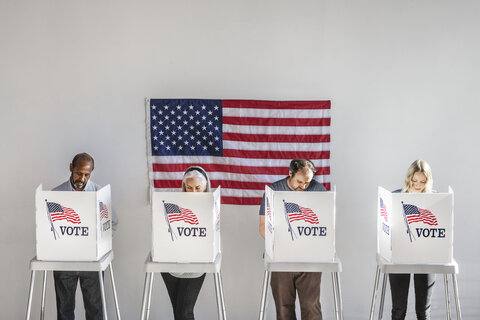Tomorrow voters in six Western states (Nevada, Arizona, Colorado, Idaho, Alaska, and Montana) will consider versions of far-reaching primary reform. In two previous posts, I outlined what has been called the “primary problem,” referring to the way potential candidates of high quality and wide potential appear to get screened out because they don’t please one or the other party base. I also discussed why some of the alternatives to the current format have failed to win widespread adoption, including older “open primary” formats that invite participation in party primaries by persons not registered with that party, and the “top two” arrangement used by California and Washington.
In this post, I’ll address why reform energy has moved on from two to higher numbers of finalists, in particular four and five, where ranked choice voting comes in, and what to make of a couple of objections.
Allowing four or five finalist spots, rather than just two, makes it more likely that each party’s base will find at least one candidate to its liking on the November ballot. It also leaves room for candidates with crossover appeal and perhaps an independent, Libertarian, or Green candidate. It should also sharply curtail tactical primary efforts aimed at elevating the weaker of two rivals because the stronger will probably make it through anyway. And it preserves the arguably valuable winnowing function by which the political season gets divided into two phases: a free-for-all in which new talents can make their pitch and dissidents proclaim their message and a finalist round that lets the public focus its attention more closely on the candidates most likely to win.
By itself, however, Top Four or Top Five would leave in place—or even perhaps worsen—a different flaw of conventional (“First Past the Post”) voting, namely the chance that the candidate who comes out on top will be one disfavored by a majority. In particular, it makes more likely a win by a candidate who might receive, say, 30 percent of the vote, against several opponents clustered in the 20s or high teens.
We’re then back to the danger that a widely disliked candidate who commands a dedicated faction will slip by through divide and conquer. That’s why ranked choice voting would seem essential, rather than optional, in this particular reform format.
As candidates and parties adjust to a new format, we can expect new strategies to evolve. In Alaska, which is now on its second cycle with Top Four voting, one trend has been for Republican leadership to twist arms to get all but the top-finishing GOP candidate to drop out between the two rounds (rather than rely on “Rank the Red” slogans to advance the same party-consolidation goal). Some object to these tactical dropouts as depriving voters of the vigorous competition that the system is meant to encourage. Maybe I’m just cynical, but I see collusion between candidates to limit electoral competition as one of the constants of all democratic systems, with the question being how best to preserve room for those who wish to compete.
The new collusion patterns should ironically help quiet the worries some have expressed that primary reform will weaken the party system; more likely it will redirect the channels by which parties exercise influence. One practical question is whether when a Top Four finisher drops out, the law should provide for the ballot line to be left blank or instead for a fifth-place finisher to get promoted into the Top Four. (I like the latter.) And it also confirms my view that Top Five, as proposed in Nevada, is to be preferred to Top Four; it’s more resistant to collusion, and ranking five lines remains well within most voters’ competence.
I’ll close with one more objection I’ve heard: that Final Four / Five is disadvantageous to third party voters who might prefer Libertarians or Greens. After all, a candidate commanding perhaps three percent of public support might not make it onto a Final Five ballot at all, at least in crowded fields (as when there’s a contested open seat). And the party would lose most or all of its “spoiler” leverage of threatening to take away enough votes from a major party candidate to change the outcome.
To me, the demise of the spoiler effect would be more a feature than a bug, while there would still be plenty of scope for “message” campaigning in the chance to participate in an easy-to-enter first round (without onerous signature-gathering requirements). Moreover, small-party challengers will frequently make it into Final Five results in less crowded fields, as when a legislative incumbent is running, and at that point the distinctive advantages of RCV for “protest” voters come into play. It lets them send exactly the message they want by casting a first vote for the candidate whose principles they prefer while using their subsequent choices to help decide the practical outcome of the race between the leading candidates. What’s not to like?

